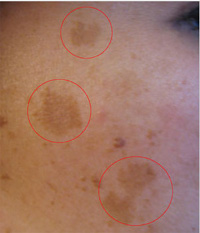 What Is Melasma?
Pregnancy is all about change, some changes are good, some are permanent and then some will only affect you over the course of your pregnancy. The ‘mask of pregnancy’ is one of these changes which will only affect you during the course of your pregnancy. Now, you may be asking yourself what on earth is the ‘mask of pregnancy’? No, that is not the medical name for it either; it is known as Melasma.
What Is Melasma?
Pregnancy is all about change, some changes are good, some are permanent and then some will only affect you over the course of your pregnancy. The ‘mask of pregnancy’ is one of these changes which will only affect you during the course of your pregnancy. Now, you may be asking yourself what on earth is the ‘mask of pregnancy’? No, that is not the medical name for it either; it is known as Melasma.
What exactly is Melasma?
Melasma is an increase in the pigmentation of the skin and this is something that many pregnant women will experience, some to a higher degree than others. Medical experts believe that this pregnancy symptom is caused by the disrelation of the progesterone to estrogen ratio in your body. Melasma is pretty easy to notice as it usually displays in the areas of the face which have been exposed to sunlight, and is generally more prominent in women who have a darker complexion.How long will Melasma last?
In most cases Melasma will remain with you until after you have given birth. However, in some cases it does not fade immediately and it can take anywhere between 3-6 months for the full effects to vanish. It must also be said that there have been some women who have had the symptoms for much longer, although they do eventually vanish completely.Can Melasma be treated?
There are several options which are available to try and treat Melasma. From Vitamin C treatments to hydroquinone, even herbal/nutraceutical lighteners, which may work in different degrees. Chemical peels, microdermabrasion and other exfoliates may help Melasma, but the results are inconsistent and often a short term solution.In conclusion
Although Melasma may be distressing and emotionally difficult for those women who do experience the “worst case” scenario, it is important to remember that it is, in most cases anyway, just a temporary symptom and is just one more ‘battle’ scar to add to your personality and beauty.Melasma



